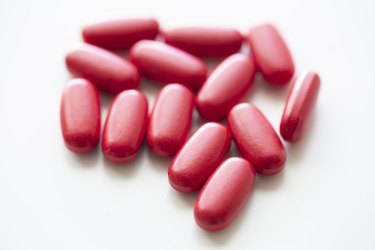
Hair loss is a real concern for many women, and iron pills have been shown to help with hair growth. Doctors can test for iron deficiency and will determine if supplements will help. In addition to iron, there are other vitamins that may help hair grow stronger and thicker.
Tip
Increasing your iron levels through supplements or eating iron-rich foods, like red meat and dark leafy greens, can help with hair loss if you have low iron levels. Vitamin C and vitamin D have also been shown to help with hair loss.
Video of the Day
Benefits of Iron for Hair
A recent study showed the benefits of iron for hair growth. One of the most common types of hair loss for women is called telogen effluvium (TE), which is hair loss that often occurs at the crown or top of the scalp. A September 2017 study in the Egyptian Journal of Dermatology and Venerology showed that premenopausal women who had low iron levels had a higher chance of having hair loss.
Video of the Day
This doesn't mean that you should automatically start popping iron supplements. It is important that you first get your levels checked to see if iron could help with your hair growth. Ask your doctor for a serum ferritin test to see what your iron level is. In the study, women whose levels were below 20 ng/ml had a higher chance of having hair loss.
Signs of Iron Deficiency
According to Harvard Health, the main reason women in the United States have iron deficiency or anemia is from childbirth or heavy menstrual periods. If you are a vegetarian, you could also be a risk for having an iron deficiency. Women who are older than 65 may have iron deficiency from internal bleeding, so it is important to get checked out by your doctor.
Those who have an iron deficiency may notice that, in addition to hair loss or thinning, they may also have fatigue, dizziness, weakness, shortness of breath or a pale complexion. If you notice these symptoms, get tested to see if low iron is the cause.
It is important not to start taking iron supplements without getting tested first, as too much iron can cause side effects, including constipation and nausea.
Read more: The Cure for Baldness May Finally Be Here
Iron for Hair Growth
How much iron should you take for hair growth? Iron is not excreted from your body at a high rate, so too much can build up and become toxic. According to the US Department of Health and Human Services, women between the ages of 19 and 50 should get 18 mg of iron per day. Women older than 50 need just 8 mg per day. If you are pregnant, however, your iron requirements bump up to 27 mg per day.
According to Cleveland Clinic, the best way to amp up your iron levels is by incorporating iron-rich foods, such as meat and seafood, into your diet. Eating a four-ounce portion of red meat twice a week should give you the iron you need. If you are vegetarian, incorporate plenty of dark leafy greens, such as spinach, as well as beans into your diet. Many cereals are now iron fortified as well. Avoid eating your iron-rich meal in the morning with your coffee, as a compound in coffee inhibits the absorption of iron.
If your doctor recommends an iron supplement for hair growth, then 18 mg of iron in a vitamin will supply 100 percent of your recommended daily value.
Read More: Does Foam or Liquid Rogaine Work Best?
Proven Vitamins for Hair Growth
In addition to iron supplements, a March 2019 Dermatology and Therapy study showed that vitamin C is beneficial for those who have both TE hair loss and another type of hair loss called alopecia areata (AA), in which your immune system attacks the hair follicle. Vitamin D is another vitamin that helps in hair growth, especially for those who have AA.
Contrary to popular belief, the study showed that biotin does not help with hair growth. One vitamin tested, vitamin A, actually caused hair loss when taken in too high of a dose. If you are experiencing hair loss, talk to your doctor to get to the root cause. If you do have low iron, supplements can help with hair growth.
- Egyptian Journal of Dermatology and Venerology: "Role of iron in telogen effluvium among premenopausal women"
- Harvard Health Publishing: "A healthy diet is the key to getting the iron you need"
- US Department of Health and Human Services: "Iron"
- Cleveland Clinic: "I’m Low in Iron — Can This Cause Me to Lose My Hair?"
- Dermatology and Therapy: "The Role of Vitamins and Minerals in Hair Loss: A Review"